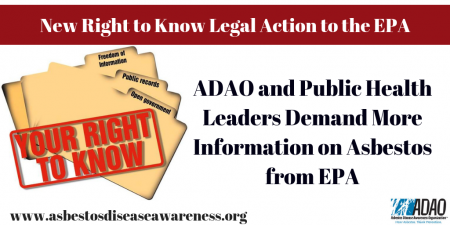Press Release: ADAO and Public Health Leaders Demand More Information on Asbestos from EPA
“Right to Know” Letter to Acting Administrator Wheeler
Posted on October 1, 2018
 The right to know is inherently American — it’s one of the most vital ways we protect ourselves from danger. Our toys come labeled with warnings of choking hazards, our restaurants are obliged to display letter grades – even our beer bottles inform pregnant women of the dangers of alcohol use. Our nation has reached a consensus: when it comes to the risks associated with a certain good or service, we quite simply have a right to know.
The right to know is inherently American — it’s one of the most vital ways we protect ourselves from danger. Our toys come labeled with warnings of choking hazards, our restaurants are obliged to display letter grades – even our beer bottles inform pregnant women of the dangers of alcohol use. Our nation has reached a consensus: when it comes to the risks associated with a certain good or service, we quite simply have a right to know.
This is a unique privilege, however, in that it is only properly realized if government and industry disclose the information we need to make informed decisions. In the case of asbestos, the American people have been flatly denied the right to know.
Most Americans believe asbestos has been banned, but in fact its use is perfectly legal with limited exceptions. Most Americans believe that they aren’t exposed to asbestos, but in fact it is commonly found in our homes, workplaces, schools and communities. Most Americans believe that the health risks associated with this mineral are a thing of the past, but in fact it still claims the lives of 40,000 Americans each year. The public is in the dark about where asbestos is, how it is used, and how it affects us. We have been denied our right to know.
The Environmental Protection Agency (EPA) is in a unique position to inform the public about dangerous chemicals, but they’ve gone out of the way to avoid collecting and disclosing vital information on asbestos. Despite the aforementioned 40,000 annual deaths from asbestos-related diseases, the EPA’s Chemical Data Reporting (CDR) rule exempts businesses from reporting their uses of asbestos.
ADAO will not stand for this. This week, with the help of the American Public Health Association (APHA), Center for Environmental Health (CEH), Environmental Working Group (EWG), Environmental Health Strategies Center (EHSC) and Safer Chemicals, Healthy Families (SCHF), we sent our Right to Know petition to Acting EPA Administrator Andrew Wheeler. This initiative asks the EPA to use its authority under the Toxic Substances Control Act (TSCA) to require importers and users of asbestos and asbestos-containing products to report on their activities and disclose these reports to the public.
There is strong precedent for these steps. In 1988, President Ronald Reagan signed into law the the Asbestos Information Act. The law required “those who manufacture or process asbestos or asbestos-containing material report to the Administrator of the Environmental Protection Agency, within 90 days after this Act’s enactment.”
The petition urges the EPA to require companies to report relevant safety information related to raw asbestos, asbestos-containing articles, and products contaminated by asbestos The petition asks that all reports be disclosed without regard to claims of confidential business information (CBI) so that the public is informed of where and how this dangerous substance is being used.
Before we buy a new snack at the supermarket, we turn over the box to check the nutrition facts. When we’re thinking of buying for a new car, we check the vehicle-safety and mileage rating. And even before we eat at a restaurant or take our car to a mechanic or see a doctor, we look up reviews on the Internet.
Recently, ADAO hosted its 13th annual congressional staff briefing, where a panel of experts spoke about the dangers of asbestos. Dr. Raja Flores, Chair of the Department of Thoracic Surgery at the Mount Sinai School of Medicine, noted companies who produce products that contain peanuts are required to place a warning on the bag to alert those with peanut allergies. Only about 150-200 Americans die from a peanut allergy each year – a figure 200 times smaller than annual asbestos deaths – but the simple warnings required for peanuts have no parallel for asbestos. The first step in filling this void is requiring companies that import and use asbestos to report to the EPA.
Experience shows that when the public is aware of a dangerous chemical or product, precautions are taken and the death toll decreases. While 38 million Americans still smoke, cigarette deaths have decreased due to increased awareness. When more Americans know where and how asbestos is being used, they will demand that it be eliminated.
More than 60 other countries have banned asbestos, yet the EPA allows for continued imports and use. In 1989, the EPA attempted to ban most asbestos-containing products, but in 1991 the final rule was overturned by the Fifth Circuit Court of Appeals on procedural grounds. Congress was dismayed that TSCA didn’t allow the EPA to ban asbestos and in 2016 strengthened the agency’s authority to regulate unsafe substances.
ADAO believes the EPA should use the new law to implement a total ban on asbestos with no exemptions. The EPA now has the legal tools and scientific evidence to justify a ban, but the Trump Administration is standing in the way. Adding this lethal chemical to the CDR rule won’t ban asbestos in itself, but it will put pressure on the EPA by documenting the ongoing risks of asbestos and how a ban can save lives.
We hope that, after reviewing our petition, the EPA will do the right thing and eliminate the exemption of asbestos from the CDR rule. But if they ignore or reject the Right to Know petition, we, the petitioners, can file suit to compel the Agency to act.
Linda Reinstein
Social Networks
